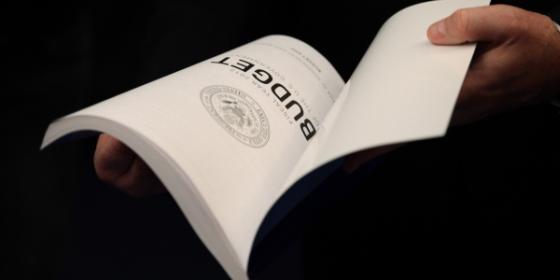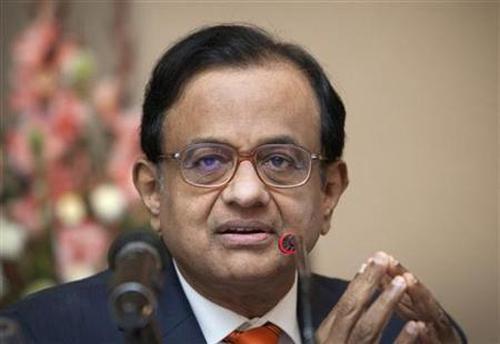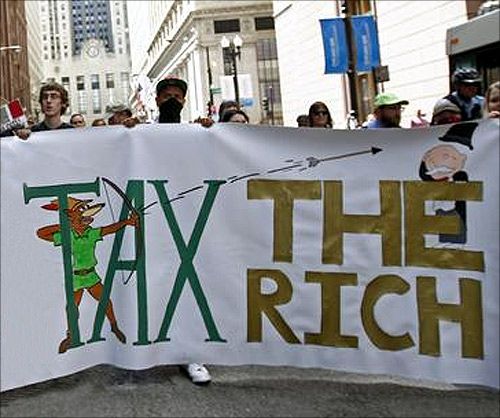Photographs: Reuters Faye DSouza
Every year the budget session of parliament heralds in a series of discussion and reports in the media. It is important for us as citizens to also understand the budget because it has a direct impact on how much money we spend, save and invest over the coming year.
This year the focus of the budget is likely to be the ballooning fiscal deficit. Now this may seem like a complicated term but it is not. Let me break this down for you.
Siddhart is a young man with a tendency to spend more than he makes. At the end of every month when he runs out of cash and he resorts to borrowing from his friends to make up for the short fall.
After several months of this behaviour, his loans have ballooned to a very large portion of his monthly salary.
That means the chances of him being able to pay off all his loans is very slim. His friends will soon realise this and stop lending him money all together.
The country's fiscal deficit is much like, Siddhart's finances. When the government spends more than it earns the shortfall is called the fiscal deficit.
...
Railway Budget, as it unfolded on February 26
Complete coverage: Union Budget 2013-14
Budget Impact Live!
What common man can expect from Budget 2013
Image: Finance Minister P Chidambaram.Photographs: Reuters
India's fiscal deficit during the financial year 2012-13 was 5.3 per cent of the national GDP, much higher than the initial target of 4.6 per cent. This is not good because it causes nervousness among investors.
he ballooning fiscal deficit has lead to several rating agencies, like Standard & Poor and Fitch, threatening to downgrade the country's credit rating to junk status. (The credit rating is an indication of its ability to payback its loans).
There are several international pension funds that invest in India, and these funds are prevented by regulation to invest in countries with junk status ratings.
If a downgrade happens these pension funds will be forced to pull out all of their money out of the country.
When so many foreign investors exit and take their money home, it will have a negative impact on our currency and our economy.
A weak rupee will result in high inflation because of the price of oil and petroleum that we import will go up.
Long story short, the finance minister's main priority during this year's budget will be to reduce the fiscal deficit. This means he will have to cut his spending and increase his revenues.
While as citizens we normally look forward to tax breaks in every budget, but this year's budget announcement may not be as generous.
...
Railway Budget, as it unfolded on February 26
Complete coverage: Union Budget 2013-14
Budget Impact Live!
What common man can expect from Budget 2013
Photographs: Reuters
Here is a list of all the major changes that are expected in the budget this year that will impact our finances.
Higher taxes for the super rich: In an attempt to increase direct tax income for the government the FM could consider imposing a surcharge on taxes for those who have an income above a threshold.
Tax experts suggest this threshold may be Rs 22 lakh (Rs 2.2 million) a year and above. Industry associations have warned that such a move may dampen business sentiment and cause more tax evasion.
Fresh deadlines for the Direct Tax code: The Direct Tax Code or the DTC is likely to be delayed further. The finance minister may want to take another look at the details of the code that have been modified drastically since he first began working on it.
Besides, most governments are hesitant to introduce such drastic changes so close to a general election.
Bigger incentives for equity investments: The finance minister is expected to announce several measures to encourage retail investors to move more of their money into equity. This would help the sentiment in the equity market.
The Rajiv Gandhi Equity Savings Scheme (RGESS) that was announced during the budget last year has failed to mobilize investor interest. The FM may modify this scheme to make it more accessible.
...
Railway Budget, as it unfolded on February 26
Complete coverage: Union Budget 2013-14
Budget Impact Live!
What common man can expect from Budget 2013
Image: Expect higher tax on physical gold purchases.Photographs: Reuters
The FM is also expected to reduce Securities Transaction Tax (STT) and short term capital gains tax on equity to boost more investor interest.
Carrot and Stick approach to Gold: As Indians we tend to invest our money into gold to keep our capital safe. The spurt in gold imports over the last year has aggravated the current account deficit.
The FM has been talking about the need to push savings into financial instruments rather than unproductive assets like gold.
So expect higher tax on physical gold purchases and a bigger tax break for long term investments like insurance and pensions.
Higher tax breaks for home loans: High interest rates and the high cost of real estate have kept several of us away from our dream homes.
In an attempt to make homes more affordable the finance minister is expected to increase the Rs 150,000 interest deduction on housing loan repayment. Some tax experts expect the allowance to be doubled.
On a parting note, you should always sit down with your financial planner in the days after the budget is announced to make sure your investment portfolio is taking full advantage of all the new tax breaks and changes made in the budget.
While the finance minister will have to focus on maintaining the balance within his accounts, you need to focus on making the most of your money.






article